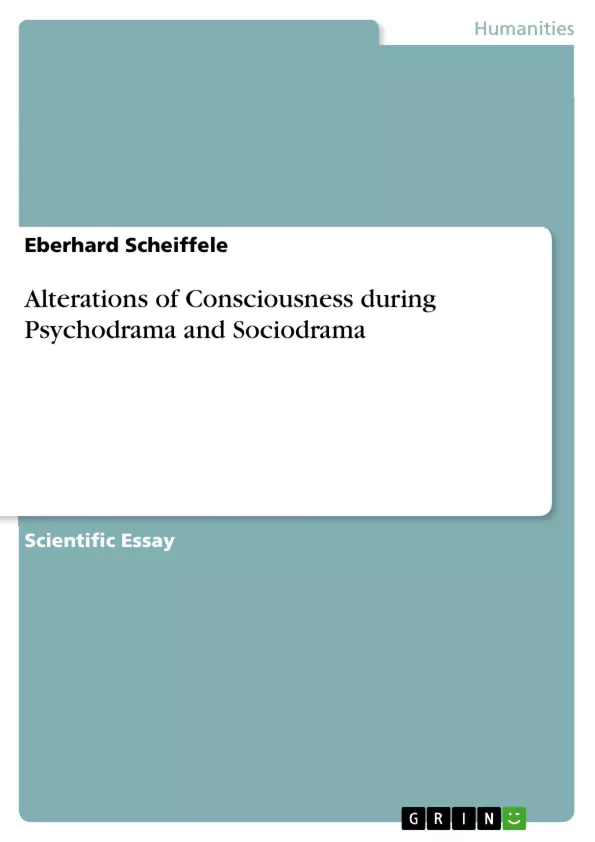Psychodrama and sociodrama participants in general, and protagonists in particular, often report that during a session their conscious experience is altered. Many are in fact drawn to experiential methods by their desire for this experience of heightened awareness. Psychodrama will be seen as altering most of the 14 dimensions of changed subjective experience that characterise altered states of consciousness (ASC’s). Psychodramatists need to be aware of both the dangers and benefits of experiencing altered states. As in hypnosis, the director needs to be especially careful not to elicit false memories or make strong suggestions.
Inhaltsverzeichnis (Table of Contents)
- Abstract
- Introduction
- Dimensions of Altered Consciousness
- Attention
Zielsetzung und Themenschwerpunkte (Objectives and Key Themes)
This article explores the relationship between psychodrama and altered states of consciousness (ASC). It examines how psychodrama induces changes in subjective experience, particularly in relation to the fourteen dimensions of altered consciousness outlined by Farthing (1992). The article aims to raise awareness of the potential for ASC during psychodrama sessions, highlighting both the benefits and dangers of these experiences.
- Altered states of consciousness in psychodrama
- Dimensions of altered consciousness according to Farthing
- Impact of psychodrama on attention and subjective experience
- Benefits and dangers of ASC in psychodrama
- The role of the psychodrama director in managing ASC
Zusammenfassung der Kapitel (Chapter Summaries)
- Abstract: This section introduces the topic of altered states of consciousness in psychodrama and sociodrama, emphasizing the subjective experiences reported by participants. It highlights the potential benefits and dangers of these experiences and emphasizes the importance of awareness for practitioners.
- Introduction: This chapter explores historical and contemporary perspectives on altered consciousness, highlighting various methods used to induce these states. It connects the desire for heightened awareness with the appeal of experiential methods, such as psychodrama and other forms of therapy. The author clarifies the article's focus on psychodrama and its relationship to Farthing's (1992) definition of ASC.
- Dimensions of Altered Consciousness: This section lays the groundwork for the subsequent analysis by introducing Farthing's fourteen dimensions of altered consciousness. It establishes the framework for examining how psychodrama might induce changes in subjective experience.
- Attention: This chapter explores the first dimension of altered consciousness: attention. It argues that psychodrama requires focused attention on the present moment, even when re-enacting past events. The author emphasizes the role of techniques used by directors to promote full presence and the creation of a "real" experience for participants.
Schlüsselwörter (Keywords)
The key terms and concepts explored in this article include altered states of consciousness, psychodrama, sociodrama, suggestibility, false memories, attention, subjective experience, and the fourteen dimensions of altered consciousness outlined by Farthing. The article focuses on the intersection of these concepts within the context of psychodrama and explores the potential implications for practitioners and participants.
Frequently Asked Questions
How does psychodrama induce altered states of consciousness (ASC)?
Psychodrama uses experiential methods that heighten emotional engagement and focus attention on the present moment, which can lead to changes in subjective perception and awareness, similar to ASC.
What are Farthing's 14 dimensions of altered consciousness?
Farthing (1992) identified 14 dimensions, including changes in attention, perception, memory, and emotional expression, which are used as a framework to analyze how therapy affects the conscious experience.
What are the benefits of ASC in a therapeutic setting?
ASC can lead to deeper insights, emotional release, and a more profound "real" experience of past or future scenarios, helping the protagonist achieve catharsis and personal growth.
What dangers should psychodrama directors be aware of regarding ASC?
Directors must be careful not to elicit false memories or use overly strong suggestions, as participants in an altered state may be highly suggestible, similar to being in hypnosis.
How does attention change during a psychodrama session?
Attention becomes highly focused on the "here and now" of the enacted scene. Even when re-enacting the past, the participant experiences it as a current reality, leading to a state of heightened presence.
- Quote paper
- Dr. Eberhard Scheiffele (Author), 2003, Alterations of Consciousness during Psychodrama and Sociodrama, Munich, GRIN Verlag, https://www.grin.com/document/86443



